
Italy-Ukraine Relations: Signs of Improvement, but No Breakthrough
Publication: Eurasia Daily Monitor Volume: 17 Issue: 27
By:

On February 7, Ukrainian President Volodymyr Zelenskyy traveled to Italy for a two-day official visit, the first since his election last April. Zelenskyy met the president of Italy, Sergio Mattarella, and Prime Minister Giuseppe Conte; he additionally visited the Vatican (Agenzia Nova, February 7). Several days later, on February 10, the Ukrainian minister of foreign affairs, Vadym Prystaiko, also arrived in Rome (La Repubblica, February 9). Several issues explain this renewed activity along the Kyiv-Rome axis. President Zelenskyy, himself, stressed that his country wants to strengthen its ties with Italy because the latter country is “a powerful [European Union] and NATO [North Atlantic Treaty Organization] member” (UNIAN, February 8). However, the Ukrainian side was also hoping to resolve two bilateral issues of fundamental concern.
First, Zelenskyy urged the Italian prime minister to shut down “the illegal offices that the DPR [Donetsk People’s Republic] and LPR [Luhansk People’s Republic] offices opened” in Italy (President.gov.ua, February 7). These quasi-diplomatic offices are lobbying for the separatist cause and were opened in several Italian cities: DPR offices in Turin (2016) and Verona (2019), and an LPR office in Messina (2018) (East Journal, February 17, 2020). Italian-language Russian media described the 2016 opening of the Turin DPR office as a “symbolic event, an important step in the DPR’s path toward independence” (Sputnik News Italia, December 15, 2016).
The second issue of concern for Kyiv is the fate of Vitaliy Markiv, who was sentenced by an Italian court to 24 years in prison after being arrested, in June 2017, for the deaths of Italian journalist Andrea Rocchelli and his Russian interpreter, Andrei Mironov. Rocchelli and Mironov were killed in a mortar attack in the Donetsk region, in May 2014 (UNIAN, February 8). Markiv had lived in Italy for 12 years before returning to Ukraine to join the Euromaidan Revolution in 2013/2014. His conviction stirred controversy in both countries. A tide of public opinion in Ukraine believes his arrest and conviction was politically motivated by the alleged sympathy of Italians for Russia (Kyiv Post, October 11, 2019). The case also ignited a diplomatic quarrel between Ukraine and Russia: in July 2019, the Ukrainian ambassador to Italy, Yehven Perelygin, gave an interview to Formiche.net accusing Russia of being behind the sentence. The diplomat’s words triggered an immediate response from the Russian Mission to Rome (Formiche.Net, July 15, 2019; Formiche.Net, July 19, 2019).
Despite these two outstanding problems in bilateral relations, Foreign Minister Prystaiko declared that, “over the past year, dialogue between Ukraine and Italy has gained new momentum” (La Repubblica, February 9, 2020). That position was echoed by his Italian counterpart, Luigi Di Maio, who confirmed that Ukrainian-Italian ties “are experiencing a moment of high-level dialogue, very positive” (Formiche.Net, February 10). The reference to the “past year” is not casual: in September 2019, Italy’s ruling coalition changed, as the Five Star Movement (Movimento 5 Stelle—M5S) entered into a center-left alliance with the Democratic Party (Partito Democratico—PD) and the smaller factions Italia Viva (IV) and Free and Equal (Liberi e Uguali—LeU). The previous government, composed of the M5S and the League (Lega), was widely seen as leaning heavily toward Russia: Matteo Salvini, the League leader, was regularly vocal about his sympathies toward Moscow (see EDM, August 1, 2018).
Indisputably, the new Italian government has been much less overtly pro-Russian compared to the previous Cabinet, de facto headed by Salvini. Still, this feeble change does not equate to automatic, greater support for Ukraine. Traditionally, Ukraine has not ranked high on the Italian political agenda (Ispionline.it, March 27, 2019). Strategically, Ukraine is crucial to Italian energy security: the 30 billion cubic meters of Russian gas that Italy imports passes entirely through Ukrainian territory, via the Ukrtransgaz transport network (Affari Internazionali, December 3, 2019). Yet, Italy has always had limited freedom of action in strengthening relations with Ukraine: on the one hand, Kyiv remains crucial for Italian energy needs, but at the same time this gas is sold by Moscow. Italy, independently from the political orientation of its governments, has tended to maintain cordial relations with Russia. But Italy has nonetheless been vocal in supporting Ukraine’s territorial integrity and the centrality of the Minsk ceasefire agreements (Formiche.net, February 10, 2020; ANSA, July 25, 2018). At the same time, however, there is widespread sensitivity in Rome regarding its perceptions of significant cultural differences within Ukraine that cannot be ignored. To strike a balance, Italy tried to promote itself as a potential mediator for years (see EDM, March 16, 2015). The new Italian government has also shown a more significant Euro-Atlantic commitment.
That said, the relations with Moscow remain substantial, particularly as Russia is becoming more and more central in the Mediterranean. The 2+2 meeting (foreign and defense ministers) that Italy held with Russia in Rome (the first since 2013) days after Zelenskyy’s visit confirmed this impression (Agenzia Nova, February 19, 2020). Though Italian-Ukrainian relations have, indeed, improved in recent months, the importance of Rome’s ties with Moscow represents a major limitation to a further deepening of the relationship with Kyiv. Meanwhile, the issues of the DPR and LPR offices in Italy and the thorny Markiv case will continue to be a burden.



